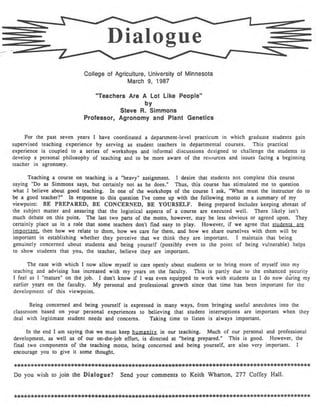
Three Be's of Teaching: Simmons & Markhart
- 1. Dialogue College of Agriculture, University of Minnesota March 9, 1987 "Teachers Are A Lot Like People" by Steve R. Simmons Professor, Agronomy and Plant Genetics For the past seven years I have coordinated a department-level practicum in which graduate students gain supervised teaching experience by serving as student teachers in departmental courses. This practical experience is coupled to a series of workshops and informal discussions designed to challenge the students to develop a personal philosophy of teaching and to be more aware of the resources and issues facing a beginning teacher in agronomy. Teaching a course on teaching is a "heavy" assignment. I desire that students not complete this course saying "Do as Simmons says, but certainly not as he does." Thus, this course has stimulated me to question what I believe about good teaching. In one of the workshops of the course I ask, "What must the instructor do to be a good teacher?" In response to this question I've come up with the following motto as a summary of my viewpoint: BE PREPARED, BE CONCERNED, BE YOURSELF. Being prepared includes keeping abreast of the subject matter and assuring that the logistical aspects of a course are executed well. There likely isn't much debate on this point. The last two pans of the motto, however. may be less obvious or agreed upon. They certainly place us in a role that some teachers don!t find easy to play. However, if we agree that students are important. then how we relate to them, how we care for them, and how we share ourselves with them will be important in establishing whether they perceive that we think they are important. I maintain that being genuinely concerned about students and being yourself (possibly even to the point of being vulnerable) helps to show students that you, the teacher, believe they are important. The ease with which I now allow myself to care openly about students or to bring more of myself into my teaching and advising has increased with my years on the faculty. This is partly due to the enhanced security I feel as I "mature" on the job. I don't know if I was even equipped to work with students as I do now d';"ing my earlier years on the faculty. My personal and professional growth since that time has been important for the development of this viewpoint. Being concerned and being yourself is expressed in many ways, from bringing useful anecdotes into the classroom based on your personal experiences to believing that student interruptions are important when they deal with legitimate student needs and concerns. Taking time to listen is always important. In the end I am saying that we must keep humanity in our teaching. Much of our personal and professional development, as well as of our on·the·job effort, is directed at "being prepared." This is good. However, the final two components of the teaching motto, being concerned and being yourself, are also very important. I encourage you to give it some thought. **************************************************************************************** Do you wish to join the Dialogue? Send your comments to Keith Whanon, 277 Coffey Hall. ****************************************************************************************
